![]()
Welcome to the February
ADHD ezine.
We get many emails from
ADHD families asking, what can I try instead of Ritalin or Adderal ~ we
have the answer and its been developed just for ADHD children! Its called
Calm Focus!
Other ADHD families wanted
help understanding learning and behavioural difficulties so we found
you a course you can take, from home!
Biofeedback and Brain Gym
exercises have helped some ADHD people and
all the information
already published in the previous ezines,
we have in electronic book
form so you can get the information relevant to you, fast!
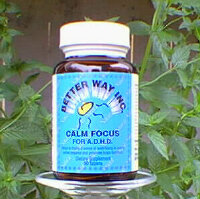 |
She has been taking Calm Focus for a little over a year along with
a low sugar, no additive diet and is doing well. It really is so
much better than giving strong, harmful medications to a child.
This is a unique all natural vitamin/herbal formula that helps to calm and focus the active child. Gaba and passion flower help to calm while vitamin C, B-vitamins, flaxseed powder, taurine, rosemary, ginkgo and grapseed extract help with blood circulation and mental concentration. It is our Number One selling product. |
This course is designed
for you to take from home as a distance learning programme
and we are very excited
about it as it is available worldwide... thats you!
The organisation doesn't
have a web site so we volunteered our services
to get this information
to you as we considered it very worthwhile.
The course looks at learning
and behavioural difficulties
and how these are related,
Dyslexia, ADHD, dealing with behavioural difficulties.
Other topics include:
|
 |
Doing this
course may interest you in several ways
|
This is a four month distance (correspondence)
course which starts March 20th 2000 and ends July 21st 2000.
How much time is needed each week? That is a difficult question because everyone comes from different backgrounds, knowledge, skills and circumstances. The best guess would be 5+ hours a week There are 4 assignments about a month apart, the first involves 10 paragraphs of 150 words, two are 1500 word essay type and one case study due by the end of the course. You are supplied with course materials and a reading list. |
The course was originally designed for teachers and teachers' aides, but if you are happy in an academic environment
"there are many intelligent and competent parents who are capable of doing the course', says James Hawkins.At the end
of the course you will get a certificate to acknowledge your successful
completion of the course if your assignments are of sufficient quality.
The course
fee is in New Zealand dollars NZ$250 which is about US$125.New Zealanders
will have to add GST.
Course tutor
is James Hawkins BA (hons) Psychology MA (Hons) with a background as a
teacher, Teachers College senior lecturer, educational Psychologist.
![]() To
enrol please contact Learning Difficulties Coaliltion, PO Box 6748, Wellington,
New Zealand (no zip code needed) with a cheque, or fax them on +64 43828943
or phone +64 43828944 or email
us with your Name, address, phone and fax and we will forward your
details on to them, and if necessary let you know the cost in your currency
for the cheque.
To
enrol please contact Learning Difficulties Coaliltion, PO Box 6748, Wellington,
New Zealand (no zip code needed) with a cheque, or fax them on +64 43828943
or phone +64 43828944 or email
us with your Name, address, phone and fax and we will forward your
details on to them, and if necessary let you know the cost in your currency
for the cheque.
We are encouraging
the Learning Difficulty Coalition to have a website, but they are not yet
on the Internet so we are supporting them with our email address until
they are, as we feel their course is so valuable for you.
One ADHD family who answered
the survey
uses Biofeed back to help
their ADHD child.
EEG Biofeedback is a learning strategy that enables persons to alter
their brain waves. When information about a person's own
brain wave characteristics is made available to him, he can learn to
change them. You can think of it as exercise for the brain.
What is it used for?
EEG Biofeedback is used for many conditions and disabilities in which
the brain is not working as well as it might. These include
Attention Deficit Hyperactivity Disorder and more severe conduct problems,
specific learning disabilities, and related issues
such as sleep problems in children, teeth grinding, and chronic pain
such as frequent headaches or stomach pain, or pediatric
migraines.
The training is also helpful with the control of mood disorders such
as anxiety and depression, as well as for more severe
conditions such as medically uncontrolled seizures, minor traumatic
brain injury, or cerebral palsy.
How is it done?
An initial interview is done to obtain a description of symptoms, and
to get a picture of the health history and family history.
Some testing may be done as well. And the person does the first EEG
training session, at which time we get a look at the EEG.
This all may take about two hours. (The details may differ among the
various affiliate offices. In some offices a full brain map, or
quantitative EEG, is routinely obtained, which may require a separate
office visit. Or more extensive testing may be done.)
Subsequent training sessions last about 40 minutes to an hour, and
are conducted from one to five times per week. Some
improvement is generally seen within ten sessions. Once learning is
consolidated, the benefit appears to be permanent in most
cases.
The EEG biofeedback training is a painless, non-invasive procedure.
One or more sensors are placed on the scalp, and one to
each ear. The brain waves are monitored by means of an amplifier and
a computer-based instrument that processes the signal
and provides the proper feedback. This is displayed to the trainee
by means of a video game or other video display, along with
audio signals. The trainee is asked to make the video game go with
his brain. As activity in a desirable frequency band
increases, the video game moves faster, or some other reward is given.
As activity in an adverse band increases, the video game
is inhibited. Gradually, the brain responds to the cues that it is
being given, and a "learning" of new brain wave patterns takes
place. The new pattern is one which is closer to what is normally observed
in individuals without such disabilities.
Now you can order ADHD electronic books, delivered to you through your email, to share with your family, teachers, and support groups so they too can understand more about ADHD and you.
| Each book contains many pages of articles and advice from the
previous issues of ADHD ezines, that were "hit" on the most on the
website since 1998. Save yourself HOURS of browsing looking
for that " must have" information!
Only $US10 (NZ$20) these electronic books can be ordered online and printed off on your own printer. Also available worldwide, is the spiral bound hard copy for $US15 + shipping (NZ$30). Email us now and put as your subject either ebook or hardcopy, and in the body of the email, which book you wish to purchase. You will be invoiced through your email, from a secure server, and upon payment, in any currency, your book will be on its way to you. Electronic copies are in Word format. Hard copy is A4, spiral bound, desktop publishing format, shipped standard mail to your supplied address. |
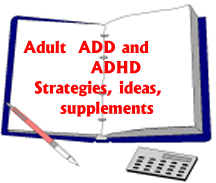 |
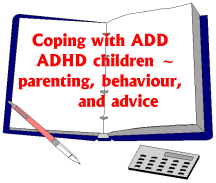 |
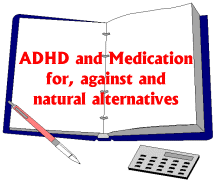 |
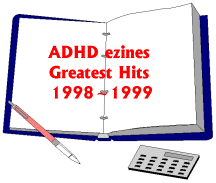 |
Click on the book you want and you will then be able to contact us directly with your request.
Brain Gym® is the registered trademark for the starter educational,sensorimotor program developed by Paul E. Dennison, Ph.D., an expert in child motor-development. It is based upon more than 80 years of research by educational therapists, developmental optometrists, and other specialists in the fields of movement, education, and child development.
Brain Gym consists of simple movements similar to the movements that children naturally do during their first three years of life as they complete important developmental steps for coordination of eyes, ears, hands, and the whole body. The Brain Gym movements have been shown in clinical experience, in field studies, and in published research reports, to prepare children with the physical skills they need in order to learn to read, write, and otherwise function effectively in the classroom. The ability to learn easily is especially important for children in the first years of school, when they are laying the foundation for their future schooling and adult life work.
Who started Brain Gym? When? Why? How?
Paul Dennison, Ph.D., President of the Educational Kinesiology Foundation,
developed the Brain Gym program over a period of 25 years work as an educational
specialist. He began researching the work as founder and director of the
Valley Remedial Group Learning Centers in California.
These eight learning centers offered Dennison clientele with whom he
could actively explore the effects of specific movements on the ability
to learn various academic skills.
During this time, he drew from a broad spectrum of innovative work in the fields of education, developmental vision, and personal development as he focused on the causes and treatment of learning disabilities. Dr. Dennison served as director of the Valley Remedial Group Learning Centers for 19 years, helping children and adults turn their learning difficulties into successful growth.
In 1980, he synthesized his work and began traveling and teaching internationally;
the Edu-K, processes and applications have
continued to evolve. The current Brain Gym Handbook, based on the work
of Dr. Dennison and his wife, Gail, was developed in collaboration with
over 29 educational kinesiologists from around the world Dr. Dennison has
been an educator for all of his
professional life. His work is based on an understanding of the interdependence
of physical movement, language acquisition, and academic achievement. His
effective and ground breaking approach to teaching grew out of his
background in brain research and experimental psychology.
He received the Phi Delta Kappa award for outstanding research at the University of Southern California in 1975 and was granted a Doctorate in Education for his research in beginning reading achievement and its relationship to covert speech skills.
| He and his wife, Gail E. Dennison, have published fourteen books and manuals, beginning with Switching On: A Guide to Edu-Kinesthetics, published in 1980, adding, Brain Gym, Teachers Edition and Brain Gym Simple Activities (students edition) most recently Brain Gym for Business: Instant Brain Boosters for On-The-Job Success published in 1994 with Jerry V. Teplitz, J.D., Ph.D. Click on the blue underlines to find out more about these books. | 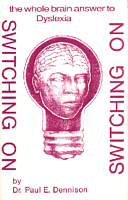 |
Switching On is a manual of hope for the concerned parents and frustrated teachers of the "unteachable" child. Used with love and confidence, the simple techniques introduced in this publication bring results in amazingly little time. They represent a revolutionary new approach to learning. It's never too late to get "switched-on" to the joy learning adds to life. |
 |
Lisa, one of the ADHD ezine readers, has just finished reading this
book and says,
" Ritalin Is not The Answer, A Drug-free, Practical Program for Children diagnosed with ADD and ADHD, can open your heart and mind to idea's that may have never been heard. Drugs are a choice and he obviously believes drugging children is not the answer but there are some excellent sources of information that will help every parent, teacher, and professional that works with individuals that present with ADD. Parents, Teachers and professionals alike need to know about all the perspectives and devise an opinion of their own. I found the book to be extremely interesting and helpful in giving me ideas for teaching and parenting. Although his opinion on drug therapy is a strong one it has much validity. In the end the choice is your own. Thanks Lisa" Click here on on the book for other reviews |
So that's it for February
We hope this ezine had continued to give you resources to help you
with ADHD and its been wonderful hearing from so many on the mailing list.Keep
reading, learning, supporting and loving, and ADHD people will finally
be recognised as the intelligent, lateral thinking, creative people they
are who can make a major and positive contribution in our world
with the right resources to help.
| Kind regards
Tricia and Mike Legg Editors ADHD ezines New Zealand |